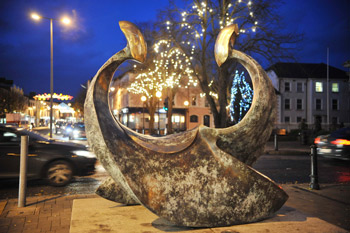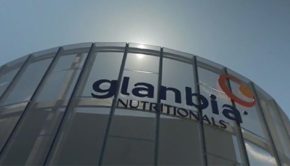Dundalk Revisited

With the weak euro making southern shopping a more attractive proposition, Gillian Hamill and Fiona Donnellan decided to travel Dundalk to discover how its retailers have been affected
18 September 2012
Snaking traffic jams with tailbacks 6km long into Newry city on Tuesday, 24 November 2009, could not be said to represent neighbouring border town Dundalk’s finest hour. While a Tuesday is not the most obvious day for an all-out shopping bonanza, you may recall that this was the day of public sector strike action in the Republic. According to newspaper reports of the time, the tills in Newry rang frantically and the Quays Shopping Centre car park was chock-a-block with southern reg cars. As one passer-by reportedly commented: "Sure every teacher in Ireland is here!"
In fact, the impact of the great northern exodus had already claimed its first high profile casualty in Dundalk. The town’s Superquinn store closed in February 2009, with all 68 workers being made redundant. This was a particularly poignant closure for the chain, given that the County Louth town was the scene of the birth of the indigenous supermarket empire in 1960.
Border trade coming full circle
Fortunately for the Republic’s retailers in the intervening years, a better value perception combined with the exorbitant cost of petrol, has served to dampen the rampant driving force behind the country’s love affair with shopping north of the border.
In fact, in recent months a weak euro has led to reports of cross border shopping coming full circle, with bargain hunters now heading south in search of a bargain. This has primarily affected retailers of electrical goods, although grocery items are also now more on a par with their northern counterparts. A recent Irish Independent survey found several items were significantly cheaper in Currys stores south of the border. For example, an iPad 2 with WiFi with 3G was €90 cheaper, whereas in November 2011, it was €11 more expensive. What’s more, a Sony laptop which was €15 more expensive in the Republic last year is now almost €50 cheaper and an Amazon Kindle can be picked up for €11 less here.
The County Donegal town of Letterkenny has wasted no time in capitalising on this momentum. Its Chamber of Commerce has launched a TV, newspaper and billboard advertising campaign in Northern Ireland to lure sterling shoppers in. Offering an exchange rate of €1.25 for £1, the Shop LK initiative has created vibrant pink posters to highlight the favourable rate available in participating stores.
Coaches arriving from the north
Activity reminiscent of the cross-border boom has ensued, with the Chamber’s chief executive Toni Forrester reporting that "the sterling take in the town is definitely increasing.” In fact, one retailer noted it "was up 30% in July compared to 2011 and up 70% against 2010”. There were even sightings of coaches arriving from across Donegal, and, for the first time in a number of years, from Northern Ireland. Meanwhile retailers JP and Mark McCloskey of Evolve Menswear, had even better tidings to report, with their sterling takings up by an immense 600% compared to this time last year.
While trade is clearly on the up in Letterkenny, ShelfLife decided to visit Dundalk, the town that frequently felt the brunt of the cross-border drive to find out if it now was experiencing a similarly improved fate. Across a broad spectrum of all types of retailers, we found a clear consensus in the city, that yes, things are looking brighter. Albeit not to the height of its halcyon days in the 1950s and 60s, when Dundalk was an industrial heavyweight in sectors as diverse as tobacco and shoes, and was the home of major manufacturers such as PJ Carroll and Clarke’s Shoes.
Exchanging trade
“We would find a lot more customers are coming back from the north and then obviously the advantage to them is that [with a 1£ = €1.25 exchange rate], they’d be getting almost 25% off,” says Peter Kierans of the fashion retailer Madame Kay.
“We don’t change the rate on a daily basis; we offer a better rate [than the banks] over a longer period of time and the traders in Dundalk have always offered that,” adds Kierans. “Now it hasn’t gone back to the heady days of offering €1.50 which we used to do, obviously a few years ago but that day may come again.”
An enticing exchange rate is not Dundalk’s only attraction, in his view moreover. “The range that Dundalk would offer is a lot more independent, we have a unique range of independent businesses which you don’t necessarily find if you go further into the cities, like Dublin, and long established people will look after their customers.”
Independent strength
Certainly, the normally ubiquitous high street brand names appear to be largely absent from some of the town’s main shopping streets such as Clanbrassil and Earl Street.
Declan McCardle is another well-known retailer in the town whose stores include EuroSaver and Tommy the Bike’s Outdoor World. “There has been a bit of an uptake in the town, even in the past couple of months and the past few weeks, so it’s been good in that regard,” he tells ShelfLife. While he has always advertised sterling exchange rates outside his store, he notes that, “at the moment it’s very favourable. Historically there’s always been a migration over and back on both sides of the border, but what we’re seeing now is more and more starting to come back to Dundalk.”
Gary Redmond, the recently appointed manager of Tesco at Dundalk Shopping Centre also believes there is a significantly smaller price disparity between northern and southern offerings within the grocery trade. “I think the southern stores have really combated it [cross-border trade] at this stage. There’s a few deals especially around alcohol, are stopping people from going across the border.”
Avoiding a boom and bust cycle
But while Dundalk is currently experiencing something of an upswing, the town’s Chamber of Commerce president Paddy Malone is in favour of moving away from a ‘boom and bust’ border cycle. He would like to see a special economic zone created between Dundalk and Newry to benefit both regions.
As it stands, a memorandum of understanding between the Newry and Mourne District and the Louth local authorities has already been drawn up. This has created a forum for local authorities in the north and south to work together and develop joint policies that are mutually beneficial. Malone still believes that more could be done though and hence he is pushing for the special economic zone which, if established, could help promote 5,000 new jobs in the area over a five-year period, according to research conducted by Louth County Council, Newry and Mourne District Council, and the Dundalk and Newry Chambers.
Minister for Enterprise Richard Bruton has already been briefed on these economic zone proposals, and at the time of our interview, Malone said he was hoping “to meet Department of Finance officials later on.” Indeed he has already met with a formidable list of politicians to secure this proposal, including MEPs, Mairead McGuinness, Liam Aylward, Nessa Childers and Gerry Adams, the latter two of which are both local TDs. He is eager to progress this issue while Ireland still holds the presidency of the Council of the European Union during the first half of 2013.
Getting into the zone
“Everybody seems to be saying, yeah it makes economic sense, but my hope now is that they do something about it while Ireland has the presidency, because if we miss the boat, it’s 17 years [to wait] again and I’m not going to be around to push it the next time.”
Explaining more about why he believes the zone is imperative, he says an unstable situation on either side of the border is simply bad for business. “I don’t want a feast or famine situation. That doesn’t allow any business in Dundalk to expand because they’d be terrified that if they built bigger shops to take the traffic today, will it disappear tomorrow?”
“I would much prefer a stable, economic zone between the two areas where we can both work to our mutual advantage. There are things that Dundalk is good in, in terms of having the independent retailer, we are much stronger in that area than they are. The department stores, they probably have the edge. So we sell our unique features, they sell their unique features, and we can both live together. But this idea of a boom and a bust situation, all that does is it creates beautiful filling stations on either side of the border, one set of which is totally empty and the other set of which is flat out and then six years later it reverses. That’s no way for stability so we don’t want it.”
Driving awareness
Working together for the mutual benefit of both is undoubtedly an admirable goal, but ShelfLife wanted to know how this would impact Dundalk’s advertising strategies north of the border. “We will do discreet advertising because we do need to sell the area,” says Malone.
The town is currently planning to erect three-metre billboards in the north with a message that reads "Your Pound Goes Further in Dundalk", the artwork for which ShelfLife has published. While it could be said that “discreet” is not the first word that comes to mind on viewing this campaign, it is of course the town’s indisputable right to advertise itself however it sees fit. Harry Trainer, owner of the Marshes Shopping Centre in Dundalk explains more about why he believes advertisements in the north, such as his own advert outside the Buttercrane Shopping Centre in Newry, are important for driving awareness, but don’t represent an effective “in-depth” approach in the long-term.
“I think the marketing for Louth or for Dundalk needs to involve a little more joined up thinking and it needs to be a little bit more refined and polished. Now that doesn’t mean that it should be in the Ulster Tatler and not in The Belfast Telegraph but it needs to have something to grab your attention and encourages you to go and look.
“A 48 sheet ad about the Marshes Shopping Centre won’t do that because you’re already in a shopping centre. But I just want to remind people, there’s another option guys. It is more targeted at those people who are already driving past here [Dundalk] to go up there, to make them think ‘actually, we should have gone there, and we might go there on the way back.’”
He also believes there is a “big difference” between local papers carrying ads for northern shopping centres and placing 48 sheets in other towns and cities which he describes as “an awareness campaign, not a marketing campaign”. Trainer is likewise in favour of a joint economic zone but sagely notes that when “you get down a layer, there will always be competition and that competition is always to ensure that you choose to come here and not drive up the road.”
The local commitment
In general though, he believes “local people, towns people primarily instead of county, they would always have looked first to their amenities on their doorstep before they opted to travel”. This tendancy has become even more pronounced in recent years. “I think there’s more of a reality now on the need to shop local because the second biggest employer now is retail, it’s not industry anymore… so they cannot afford to do anything else. It’s a simple philosophy.”
On walking around the town, this commitment to local retailers can clearly be seen. “Shop in Dundalk. Save Shops” stickers from an earlier Christmas campaign still adorn several shopfronts. Dundalk Chamber of Commerce and the town centre commercial manager Andrew Mawhinney, who was appointed under the Business Improvement Development Scheme (BIDS), have also taken steps to ensure that the local spend stays in the town as much as possible by introducing the closed loop ‘Nice One!’ gift card that can only be used in Dundalk stores.
The overall purpose of BIDs is to drive business in the town by “creating a competitive environment to attract investment.” In this regard, a EUR*3 million investment in 2010 to rejuvenate the town’s Market Square proved a major coup. The square has now become a cultural hub for Dundalk, hosting a range of events as diverse as food markets right through to a Jedward concert.
An attractive place to do business
Local auctioneer PJ Roddy of Property Partners Laurence Gunne, explains that the town has also managed to help businesses by lowering its commercial rates. In general, he notes that there has been a reduction of 30% or 40% in rents in recent years and he is receiving many more enquiries now due to the greater degree of realism entering the market. “But what we really need to do is get the commercial rates down,” he says, “and Paddy has been doing an awful lot of work on that with the chamber.” Significantly, a 7% reduction in rates has been secured in the last three years and the chamber is also striving to have valuations changed to reflect common usage. “They were based on when Dundalk was a booming town in the 50s and 60s, not where we are today, so that has to be changed,” says Malone.
A rent incentive has also been introduced whereby if shops were closed for three or more years in certain areas, the town council will reduce the rates bill for the new occupant by 50%. “We have found that even in certain other cases, myself and Andrew have been able to go to the town council and they have shown flexibility in relation with rates,” adds Malone. “So the town council are working with the retail sector to put some life back into the town. We’d never be 100% satisfied, but we are getting there.”
A unit within the county council has also been introduced with the express function of helping new businesses to cut through the high degree of red tape blocking their way from opening, in terms of planning permission, high rates etc. The success of this trouble-shooting mechanism is proven by the fact that, according to Mawhinney, “it’s been copied by 19 other local authorities”.
Ultimately, a boom and bust cycle may always be somewhat unavoidable due to Dundalk’s proximity to the border. Yet it seems that these are the initiatives that will help the town secure a greater degree of sustainable success in the future, by making it an attractive destination where shoppers actively want to spend their time.
In a nutshell: Dundalk
- €3 million was invested in 2010 to rejuvenate Dundalk’s Market Square
- Dundalk is erecting three-metre billboards in the north that read: "Your Pound Goes Further in Dundalk."
- The ‘Rhyme and Rhythm’ sculpture on Earl Street by Sandra Bell (Source: Create Louth) is where President Clinton stood during his visit in 2000 and can be interpreted as representing dialogue between the north and south
- The Marshes Shopping Centre has proved a hit with Dundalk’s teenagers, so much so that a local slang term, “going Marshing” has developed
- Owner Harry Trainer says the team at Marshes Shopping Centre has “worked consistently hard” and is therefore “consistently performing a little bit better than most”
Cross-border trade by numbers
6: the length in km of the traffic tailbacks into Newry city centre on 24 November 2009
22,500: The number of weekly transactions in Asda Strabane, Co Tyrone, coming from the Republic back in November 2009
30: The percentage of cars in Derry’s Foyleside Shopping Centre car park with a southern registration in November 2009
1 billion: The figure in euros that retail analysts at the University of Ulster predicted the loss to the ROI economy could exceed by the end of 2009 due to cross-border trade
810 million: The government’s estimated loss in euros to the southern economy in 2009 caused by cross-border trade
1: The ranking of the most successful Asda store in Northern Ireland reported in 2009; Asda Enniskillen
30: The percentage shoppers believed they could save in the north in 2009, with one consumer stating she saved around €100 to €130 on each shopping trip.
400: The number of job losses announced by Superquinn in February 2009, with 68 jobs lost through the closure of the Dundalk store and a further 332 jobs cut in other stores
90: The number of euros by which an iPad 2 with WiFi and 3G is now cheaper when bought in the South – last year it was €11 more expensive
2: The percentage by which Finance Minister Michael Noonan increased VAT in the Republic, to 23% from 1 January 2010 onwards
670 million: the euros Minister Noonan said his VAT hike would deliver for the Republic’s exchequer



 Print
Print






Fans 0
Followers